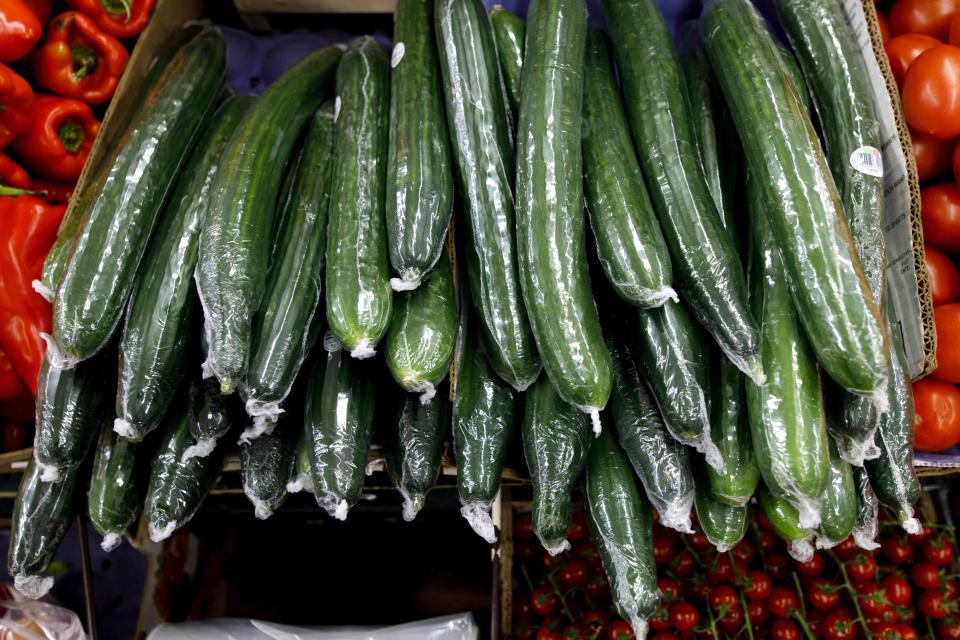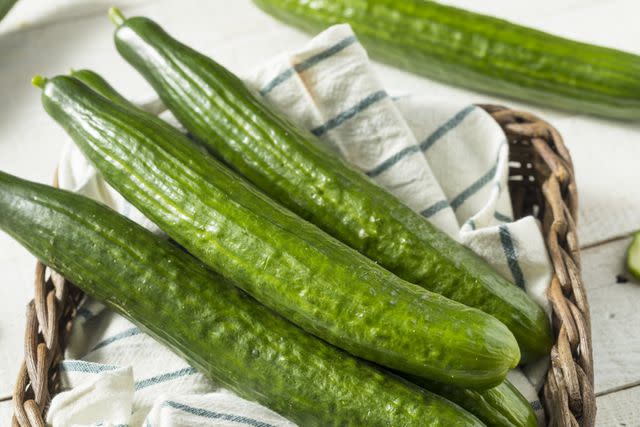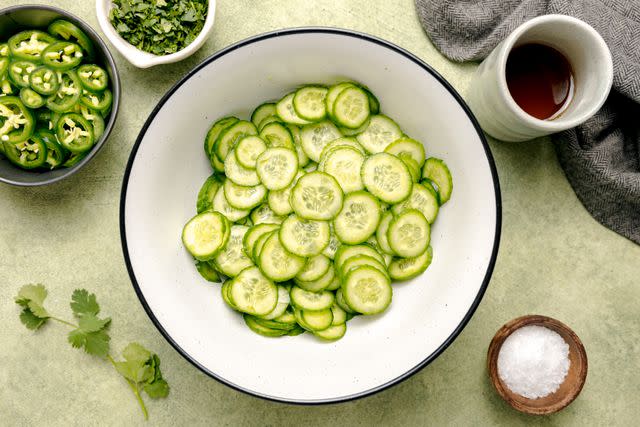The 3 Reasons English Cucumbers Come Wrapped In Plastic
And experts provide the solution to single-use plastic.

Simply Recipes / Getty Images
Cucumbers are one of the few produces I keep stocked in my kitchen year-round. As a key ingredient in some of my favorite dishes like fattoush, gazpacho, and spicy smashed cucumber salad, this vegetable (a fruit, depending on who you ask) brings a burst of freshness to meals that really can’t be replicated by any other ingredient.
There are a few varieties of cucumbers to choose from at my local grocery store. For snacking, I reach for the small, sweet Persian cucumbers nestled in groups of five or six on a cardboard tray wrapped in plastic. If I’m pickling, I opt for Kirby cucumbers, the bumpy, thick-skinned variety—I think their flavor is too strong so I boot them out of the snacking category.
For pretty much anything else, English cucumbers are my go-to. With thin, palatable skin and small seeds, they’re easy to prepare and taste delicious in all my favorite cucumber-centric dishes. I only have one hang-up: they’re always wrapped individually in plastic! (I'm not the biggest fan of single-use plastic.)

Simply Recipes / Getty Images
3 Reasons Why English Cucumbers Are Wrapped in Plastic
Why is it that some cukes roll around sans-packaging, while my beloved staple variety is confined to a plasticky prison? After a bit of research, I’m happy to report there are very good reasons, and even happier to report that companies are working on eco-friendly alternatives to single-use packaging. Read on to learn why the packaging is so important for English cucumbers.
1. Plastic Wrap Helps Keep Moisture In
As J. Kenji Lopez-Alt points out in his book The Food Lab, English cucumbers have thin skins. This makes them susceptible to losing moisture as they sit on grocery shelves, transforming them from crisp and snappy to tough and bendy. The plastic wrap provides a second skin to keep moisture sealed inside the cucumber for longer.
This concept applies to any variety of cucumbers, as Cooks Illustrated proved while experimenting with storing American cucumbers. Between cucumbers stored loose in a resealable bag and those wrapped tightly with plastic wrap, the plastic-wrapped veg outlasted the ones in a resealable bag by twice the amount of time—a full 10 days vs. five days!
The cucumbers in the resealable plastic bag had room to breathe and release moisture—this created a moist environment ideal for housing microorganisms that cause rot. This was not a problem for the tightly wrapped cucumbers.
2. Plastic Wrap Prevents Bruises and Scrapes
An issue with thin-skinned English cucumbers is their propensity to be nicked, scratched, and bruised as they are transported from farm to store. Not only do shoppers prefer unblemished produce, these bumps and scratches can develop mold and rot, one reason why the FDA recommends buying fruit and vegetables that are not bruised or damaged.
3. Plastic Wrap Keeps Decay-Causing Oxygen Out
If you’ve ever worked with or around food, there’s a chance that you’ve had to learn the mnemonic device “FAT TOM”, which stands for the six conditions required for the growth of foodborne pathogens.
The “O” represents oxygen—it accelerates food spoilage as most microorganisms require oxygen to grow and multiply. Oxygen also causes oxidation, which turns the cucumbers brown. Just as the plastic wrap around English cucumbers keeps moisture in, it also keeps oxygen out, therefore slowing the rate of decay.

Simply Recipes / Ciara Kehoe
The Best Way To Store Your Cucumbers
Not going to enjoy your cucumbers within a day or two? Following suit with cucumber distributors, the best way to keep cucumbers fresh at home is to wrap them tightly with plastic wrap. Store them in the warmest part of your fridge—towards the front, farthest from the cooling elements as they prefer being stored at around 55°F. And hold off from washing them until you’re ready to enjoy them.
Once cut, keep them wrapped in plastic and, as a smart option, double up by placing them in a resealable bag or container to reduce the amount of oxygen exposure.
I Don’t Like Single-Use Plastic. What's the Alternative?
Several companies are working on a storage solution for English cucumbers that cuts down on plastic waste. The folks at NatureFresh Farms are using a 100% compostable cucumber wrap made from a starch-based material meant to decompose.
Apeel Sciences has come up with a solution that keeps cucumbers (and a whole host of other produce) fresh by creating an edible coating derived from food to seal moisture in and keep oxygen out, just like its plastic counterpart. Some farms have already made the switch to Apeel, and there’s a good chance their products are popping up in a grocery store near you.
And if you’re looking to reduce your plastic use at home, give Compostic a try. Their cling wrap and resealable bags are compostable, a great low-waste alternative that will keep your cukes snappy and fresh.


